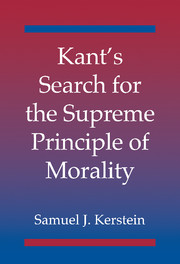Book contents
- Frontmatter
- Contents
- Acknowledgments
- Key to Abbreviations and Translations
- Introduction: Derivation, Deduction, and the Supreme Principle of Morality
- 1 Fundamental Concepts in Kant's Theory of Agency
- 2 Transcendental Freedom and the Derivation of the Formula of Universal Law
- 3 The Derivation of the Formula of Humanity
- 4 The Derivation of the Formula of Universal Law: A Criterial Reading
- 5 Criteria for the Supreme Principle of Morality
- 6 Duty and Moral Worth
- 7 Eliminating Rivals to the Categorical Imperative
- 8 Conclusion: Kant's Candidates for the Supreme Principle of Morality
- Notes
- Index
3 - The Derivation of the Formula of Humanity
Published online by Cambridge University Press: 06 September 2009
- Frontmatter
- Contents
- Acknowledgments
- Key to Abbreviations and Translations
- Introduction: Derivation, Deduction, and the Supreme Principle of Morality
- 1 Fundamental Concepts in Kant's Theory of Agency
- 2 Transcendental Freedom and the Derivation of the Formula of Universal Law
- 3 The Derivation of the Formula of Humanity
- 4 The Derivation of the Formula of Universal Law: A Criterial Reading
- 5 Criteria for the Supreme Principle of Morality
- 6 Duty and Moral Worth
- 7 Eliminating Rivals to the Categorical Imperative
- 8 Conclusion: Kant's Candidates for the Supreme Principle of Morality
- Notes
- Index
Summary
Outline of the Derivation
On the received view, Kant's derivation of the Formula of Universal Law fails, and, if I am correct, Allison's attempt to rescue it also falls short. But the Formula of Universal Law is not the only principle Kant defends. He also advocates the Formula of Humanity: “So act that you treat humanity, whether in your own person or in the person of any other, always at the same time as an end, never merely as a means” (GMS 429, emphasis omitted). Perhaps the Groundwork derivation of this principle is a success. This chapter explores whether Kant shows that if there is a supreme principle of morality then it is the Formula of Humanity.
From the outset, we should keep in mind that Kant employs “humanity” in a somewhat technical sense. The term does not refer to the class of human beings but rather to a set of capacities. In the Metaphysics of Morals, Kant tells us that “the capacity to set oneself an end – any end whatsoever – is what characterizes humanity (as distinguished from animality)” (MS 392). So at the very least, to have humanity involves having the capacity to set ends. Kant, it seems, uses “humanity” interchangeably with “rational nature” (e.g., GMS 439). In doing so, he suggests that to have humanity is to have certain rational capacities. Indeed, for Kant the capacity to set ends is a rational capacity.
- Type
- Chapter
- Information
- Kant's Search for the Supreme Principle of Morality , pp. 46 - 72Publisher: Cambridge University PressPrint publication year: 2002



